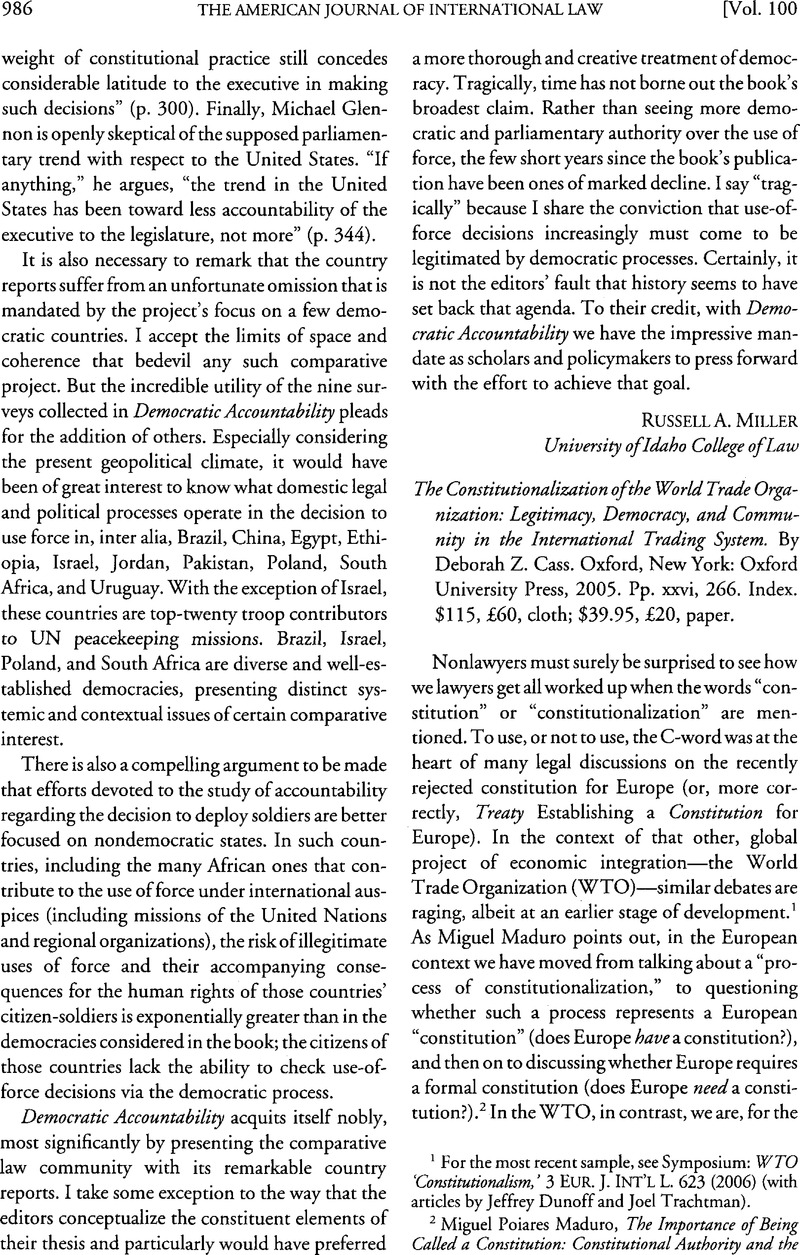No CrossRef data available.
Article contents
The Constitutionalization of the World Trade Organization: Legitimacy, Democracy, and Community in the International Trading System. By Deborah Z. Cass. Oxford, New York: Oxford University Press, 2005. Pp. xxvi, 266. Index. $115, £60, cloth; $39.95, £20, paper.
Published online by Cambridge University Press: 27 February 2017
Abstract

- Type
- Recent Books on International Law
- Information
- Copyright
- Copyright © American Society of International Law 2006
References
1 For the most recent sample, see Symposium: WTO ‘Constitutionalism,’ 3 Eur. J. Int’l L. 623 (2006) (with articles by Jeffrey Dunoff and Joel Trachtman).
2 Miguel Poiares, Maduro, The Importance of Being Called a Constitution: Constitutional Authority and the Authority of Constitutionalism, 3 Int’l J. Const. L. 332, 332 (2005).Google Scholar
3 See, e.g., John, H. Jackson, The World Trade Organization: Constitution and Jurisprudence (1998).Google Scholar
4 See, e.g., Ernst-Ulrich, Petersmann, Constitutional Functions and Constitutional Problems of International Economic Law (1991).Google Scholar
5 See, e.g., Weiler, J. H. H., The Transformation of Europe, 100 Yale L.J. 2403 (1991).CrossRefGoogle Scholar
6 For a more extensive analysis, see European Constitutionalism Beyond The State (Weiler, J. H. H. & Marlene, Wind eds., 2003).Google Scholar
7 Best represented by Robert, Howse & Kalypso, Nicolaidis, Legitimacy and Global Governance: Why Constitutionalizing the WTO Is a Step Too Far, in Efficiency, Equity, and Legitimacy: The Multilateral Trading System at the Millennium 227 (Roger, B. Porter, Pierre, Sauve, Arvind, Subramanian, & Americo, Beviglia Zampetti eds., 2001).Google Scholar
8 See, more recently, Jeffrey, Dunoff, Constitutional Conceits: The WTO s ‘Constitution ‘and the Discipline of International Law, 17 Eur. J. Int’l L. 647, 647 (2006)Google Scholar (“Might international lawyers use constitutional discourse as a rhetorical strategy designed to invest international law with the power and authority that domestic constitutional structures and norms possess? If so, this strategy may be self-defeating.”).
9 See also Joel, P. Trachtman, The Constitutions of the WTO, 17 Eur. J. Int’l L. 623, 625 (2006)Google Scholar (speaking of “three intertwined elephants”: the domestic, WTO, and general international law levels).
10 John, H. Jackson, Sovereignty, the WTO, and Changing Fundamentals of International Law 215 (2006).Google Scholar
11 This view was held not only by Neo-Kantians such as Petersmann, but also by American conservatives, even those generally concerned with preserving U.S. sovereignty. See, e.g., John, O. McGinnis & Mark, L. Movsesian, World Trade Constitution, 114 Harv. L. Rev. 511, 515 (2000)Google Scholar (arguing that since protectionism inherently harms the majority, WTO agreements tying the hands of domestic politicians to the mast of free trade “act to restrain protectionist interest groups, thereby promoting both free trade and democracy”).
12 For an overview, see Erika de, Wet, The International Constitutional Order, 55 Int’l & Comp. L.Q. 51 (2006).Google Scholar
13 Jed, Rubenfeld, Unilateralism and Constitutionalism, 79 N.Y.U. L. Rev. 1971 (2004)Google Scholar 1971.
14 Id. at 1971.
15 Weiler, J. H. H., In Defence of the Status Quo: Europe’s Constitutional Sonderweg, in European Constitutionalism beyond the State, supra note 6, at 7.Google Scholar The term Sonderweg was traditionally used to describe the “special path” that Germany followed—that is, Germany’s own, unique course (including National Socialism and the Holocaust) as determined by its own evolution and history.




